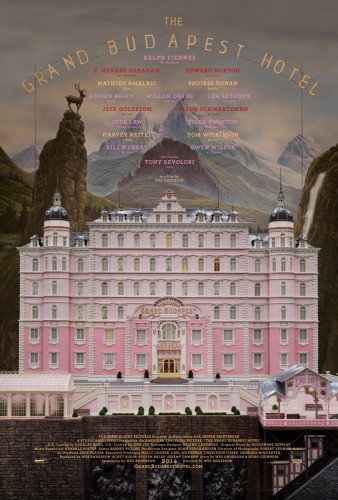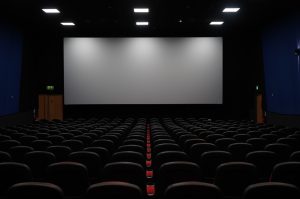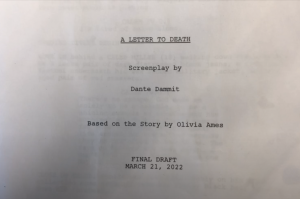
Wes Anderson‘s “The Grand Budapest Hotel” (2014) is the kind of movie which could have been made in the 1930s, the time the movie is supposed to take place, and it would have been directed by Ernst Lubitsch, who also made Eastern European flavored comedies in made up cities. It would have starred Maurice Chevalier and had a couple of songs. Or Preston Sturges could have written it and filled it with slapstick comedy and peppered it with zingers and one-liners.
That is partly what makes me admire “The Grand Budapest Hotel.” It is a tip of the hat to the great comedies before it. It has a playful style to it but after a while it almost becomes too much of a good thing. It is too silly and the actors seem to know it, acknowledging it in with every movement, breaking one of the golden rules of comedy — always play it straight. Don’t let the audience know you are in on the laugh.
It is that eccentric behavior and quirky nature which have become staples in Wes Anderson’s movies and it is because of those qualities I am usually not among his ardent fans. Technically Anderson puts on a good show. There is nice cinematography in the movie, some good performances scattered throughout, nice production and costume designs but Anderson’s movies lack heart. His sense of humor is an acquired taste at best. My favorite of his movies is the animated “Fantastic Mr. Fox” (2009).
“The Grand Budapest Hotel” seems on track to become one of Mr. Anderson’s most popular films. There has been a strong marketing campaign in effect and it has received some positive reviews. The screening I attended was nearly sold out. It could be Anderson’s most mainstream movie to date.
But popularity doesn’t equal quality. Anderson’s previous film, “Moonrise Kingdom” (2012) hit a soft spot with audiences and was even nominated for a best original screenplay Oscar but I didn’t like that movie either. “The Grand Budapest Hotel” may be destined for the same future with audiences too.
The movie primarily takes place in 1932 in a made up Eastern European country called Zubrowka. We follow a concierge of the “famous” Grand Budapest Hotel, M. Gustave (Ralph Fiennes). He has an impeccable reputation. All of the elite guest of the hotel love him. He is a perfectionist. He attends to the guest every want. And he is known to sleep with some of the older female guests. There is one in particular, Madame D. (Tilda Swinton), who at 84 has fallen in love with Gustave. She has suddenly turned up dead and Gustave is the main suspect. But he is a man falsely accused.
This is not a Hitchcockian, man on the run thriller though. Helping Gustave clear his name is the hotel’s bell boy, Zero (Tony Revolori) but before Zero can do that, dead bodies start to turn up. Bodies of the very people who could help Gustave. The man doing it is Jopling (Willem Dafoe) who is acting on the order of Dmitri (Adrien Brody), the son of Madame D. Dmitri is upset because his mother left Gustave a priceless painting, which Gustave has stolen.
The biggest problem I have with the movie is the characters are not real. They are caricatures. They are too broad. The movie is laughing at itself. Anderson seems to think it is funny if his characters have mustaches and wear funny looking clothing. It makes the characters too self-aware. You almost suspect the actor themselves think this is all hilarious and want to laugh on-screen. Before many of the actors say a word in the movie the audience starts laughing just by looking at them. This happened repeatedly at the screening.
Still, there are elements to enjoy. Ralph Fiennes gives a good performance. He shows more restraint then some of his co-stars. Fiennes can rarely do wrong. F. Murray Abraham serves as the movie’s narrator and does a fine job. The makeup used on Tilda Swinton is impressive making her look like an 84-year-old woman. And the cinematography is pleasant to look at.
Usually a comedy that makes fun of itself and doesn’t hold back is fun to watch. I enjoy comedies like “Duck Soup” (1933) and “Diplomaniacs” (1933) absurd political satires that wink at the audience. The difference between those movies and “The Grand Budapest Hotel” is I find those movies funny. I relate to the humor, but Wes Anderson doesn’t strike me as funny. I don’t always get his humor.
There’s an audience for “The Grand Budapest Hotel”. Those that have enjoyed all of his previous films. For those like me, who don’t get Wes Anderson’s appeal, there are things we can enjoy and the movie is better than some of his other efforts, still, it is not a complete success if you aren’t in step with his style.
Also, in typical Wes Anderson fashion, for a movie with Budapest in the title, the movie doesn’t take place there and wasn’t even filmed there. It was shot in Germany instead. I guess that’s another Wes Anderson “joke.”










Be First to Comment